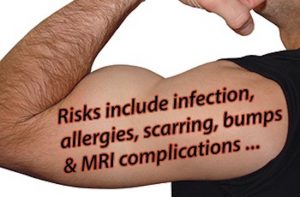Physician discusses things to consider before getting a tattoo
Chronicle Media — August 19, 2016
While local and state authorities regulate tattoo parlors, tattoo ink and ink colorings are not approved by the U.S. Food and Drug Administration. (Photo courtesy U.S. FDA)
Years ago, tattoos were primarily found only on the bodies of sailors and carnival workers.
Times have changed, however, and today you’ll find people from all walks of life sporting skin art of all sizes.
In fact, a recent NBC News/Wall Street Journal poll found that 40 percent of those responding had someone in their household with a tattoo, up from 21 percent in 1999. At last count, some 45 million Americans have at least one tattoo.
But just how safe are tattoos? The U.S. Food and Drug Administration published a Consumer Health Information article explaining what everyone should know before and after they get a tattoo.
Permanent tattoos are made by using needles to inject colored ink below the skin’s surface. This has potential to cause short or long term risks on the body, according to the FDA.
While local and state authorities regulate tattoo parlors, tattoo ink and ink colorings are not FDA approved. Many ink colors are industrial-grade colors suitable for printers’ ink or automobile ink.
Temporary henna tattoo ink has not been FDA approved, either. It is only approved for use as a hair dye.
The FDA lists the following associated risks to keep in mind when getting a tattoo:
- Infection. Make sure the tattoo parlor you visit is clean and sanitary in its processes. Dirty needles can spread infections or diseases. Some infections will respond to antibiotics, but others may not.
All tattoo artists may not adhere to strict hygiene or antiseptic techniques, says Dr. Christopher Hughes, an Advocate Medical Group family medicine physician at Advocate Eureka Hospital in Eureka.
“Even with the best precautions, infection can still occur,” he says
Hughes warns that unclean needles can result in heart valve infections, hepatitis B and C, and even HIV. “All of these conditions can lead to serious health consequences,” he says.
- Allergies/Reactions. These can vary from person to person. The FDA has received reports of bad reactions to tattoo inks after getting a tattoo. Some report itchy or inflamed skin around their tattoos in the summer due to heat from the sun.
“Delayed hypersensitivity reactions that can occur weeks to months after a tattoo is finished,” says Hughes. “These are generally caused by metallic salts within the ink.”
- Scarring. Scar tissue may form on the surrounding skin when getting or removing a tattoo.
- Granulomas. These small knots or bumps may form around ink material because the body is trying to remove something foreign from the skin.
- MRI complications. Some experience swelling or burning in the tattoo when they go through an MRI. Be sure to inform the radiologist or technician so appropriate precautions can be taken.
If you think you can change your mind about your tattoo later on, keep in mind that removal is costly, time consuming and painful.
Tattoo removal is typically done by laser treatment, which delivers short flashes of light at very high intensities to the skin to break down the tattoo ink, according to the FDA. It requires repeat visits every several weeks to remove a tattoo, and it may never be entirely gone.
“Other techniques for removal include an abrasive process that remove the superficial layer of skin, cryosurgery, thermal cautery, and surgical resection,” states Hughes. “All of these therapies can leave visible scars. They are generally not covered by insurance.”
The FDA also warns against do-it-yourself tattoo removal products. These acid-based products are not FDA approved and can cause bad skin reactions.
Consult a healthcare provider – not a tattoo parlor – if you want a tattoo removed.
—
Physician discusses things to consider before getting a tattoo —







